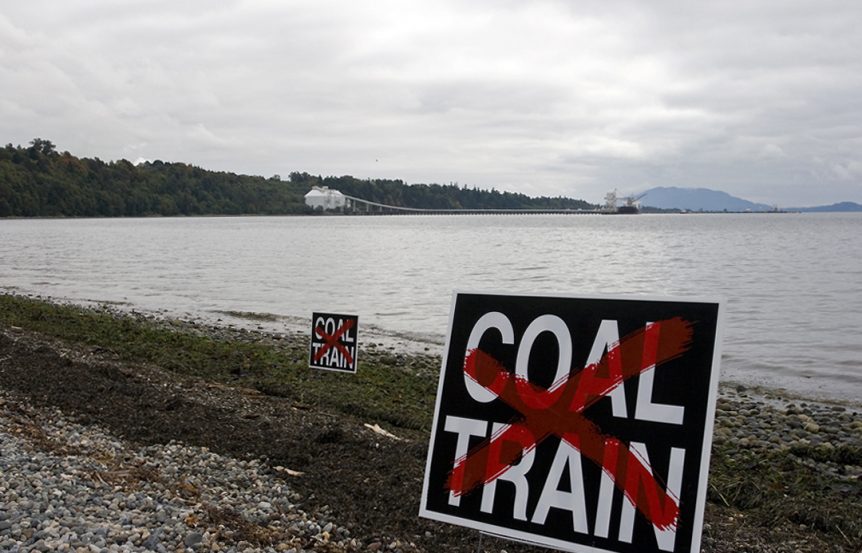FOR IMMEDIATE RELEASE
October 12, 2018
Contacts:
Regna Merritt, Oregon Physicians for Social Responsibility, Co-Director Power Past Coal, regna@oregonpsr.org, (971) 235-7643
Caleb Heeringa, Deputy Press Secretary, Sierra Club’s Beyond Coal campaign, caleb.heeringa@sierraclub.org, (425) 890-9744
Longview community rejects proposed coal export terminal as Trump Administration restarts federal review
KELSO, WASHINGTON – Citing numerous unavoidable impacts to public health, a committee of Longview residents has recommended that the proposed Millennium Bulk Terminals coal export project not be built. A majority of advisory committee for Cowlitz County’s Health Impact Assessment agreed to oppose the building of the project. The committee also proposed guidelines for future industrial development projects in the county.
The rejection of the project by the majority of the Health Impact Assessment committee comes as the U.S. Army Corps of Engineers restarts the review process for the project that is all-but-dead after being denied necessary state-level permits. The Army Corps notified state agencies and tribal governments last month that it was restarting work on an Environmental Impact Statement for the project.
The Army Corps completed a draft EIS in 2016, but shelved the process after the Washington Department of Natural Resources, Cowlitz County, and Washington Department of Ecology all denied permits that are necessary for Millennium to construct and operate due to significant and unavoidable environmental and public health impacts. In fact, the Ecology permit denial — a necessary Clean Water Act certification — explicitly prevents the Army Corps from issuing its federal permit. Millennium and its parent company, Utah-based Lighthouse Resources, has responded by suing Washington’s Governor Jay Inslee and other state officials in five different cases.
Jasmine Zimmer-Stucky, co-director of the Power Past Coal coalition, issued the following statement:
“Washington state and Cowlitz County already conducted a thorough review process and found that this project violated state law and would harm our health, air, and the Columbia River. The Army Corps is attempting an end-run around state laws. The Pacific Northwest is moving towards a clean energy future despite the Trump administration’s efforts to cater to the dirty coal industry.”
Regna Merritt, co-director of the Power Past Coal coalition, issued the following statement:
“The Health Impact Assessment Steering Committee spent months trying to find a way to protect the health of the Longview community if the largest coal export terminal in North America were built. In the end, that proved to be an impossible task – there’s no way to get around the elevated rates of cancer, lung disease, and asthma that this project would bring.”
The Health Impact Assessment Steering Committee will host an open house in mid-November to present their findings and recommendations to the public.
Background on the project’s impacts that were highlighted in Cowlitz County’s draft Health Impact Assessment:
Air Pollution
- Increased cancer rates in communities near the rail line. (p.16, 17)
- Overlapping effects of coal dust and diesel particulate matter (DPM) exposure can lead to death, hospitalization from heart and lung disease, asthma attacks, pneumonia, decline in lung function, asthma in children, plus growing evidence of stroke, Type 2 diabetes, neurological and cognitive impairment, and pre-term and low-birth-weight babies. (p.12)
- People most likely to experience negative health impacts from degraded air quality caused by the terminal are infants, children, pregnant women, stroke survivors, and those who have already experienced health conditions such as heart and lung disease, respiratory infections and diabetes. (p.3)
- Cowlitz County residents already experience higher rates of death and hospitalization related to air pollution than the WA state average. (p.13)
- Environmental justice issues exist when a new source of air pollution threatens a community already experiencing health disparities. (p.13)
Noise Pollution
- Cowlitz County and the neighborhoods that would be most impacted by increased noise and vibration already experience higher than average rates of heart disease, obesity, diabetes, reproductive problems in men and women, high blood pressure in children and impacts on test scores in schools. (p.5)
- Research suggests that increased noise would contribute to increased mortality rates. (p.33)
Delayed Emergency Response
- An average of 16 trains each day (480 trains monthly) would travel to and from the proposed terminal. These trains would increase wait times for emergency response vehicles at each crossing. No rail construction or infrastructure improvements outside the project area are proposed by Millennium. (p.5)
Water Pollution and Toxins
- Operations of the proposed terminal would likely increase polyaromatic hydrocarbons (PAHs) in the local environment. PAHs are linked to skin, lung, bladder, liver and stomach cancers. (p.6)
- A small number of people could be exposed to PAHs by consuming freshwater shellfish contaminated by PAHs from terminal operations. (p.34)
Degraded Recreation and Community Assets
- Bicyclists and pedestrians could have 8-10 minute delay at at-grade crossings. Vehicles waiting at crossings could spill over into intersections and reduce or block visibility of pedestrians and cyclists. (p.29)
- Train horns could be a disincentive for recreation at Archie Anderson Park, Highlands Trail, Gerhart Gardens, all of which are 1000 ft from Reynolds Lead rail line. (p.30)
- See parks, daycares, K-12, hospitals, assisted living, fire stations in study area (p.30)
Increased Risk to Climate
- Greenhouse gases (GHG) generated by the proposed terminal would be 51.75 million metric tons of carbon dioxide equivalent between 2018 and 2038 – roughly the same as operating 552,000 more cars per year for that same time. (p.5)
- Rising GHG drive higher temperatures, more acreage burned in wildfires, declines in snowpack, increased flood risk, and sea level rise that endanger the health and well-being of WA residents. (p.5)
Background:
If this project were approved, 1.3-mile-long trains would move 44 million tons of coal from the Powder River Basin and the Uinta Basin to Longview, WA each year. Sixteen uncovered coal trains would move in and out of Longview each day. Coal would be stored on the banks of the Columbia River in uncovered piles 8 stories high and 40 football fields wide.
Underscoring threats to human health and safety, the Washington Department of Ecology denied a key water quality permit in 2017. The Washington State Department of Natural Resources denied two permits in 2017. Two more permits were denied in November 2017 by the Shorelines Hearing Examiner, who cited multiple unavoidable impacts to public health, safety and tribal fishing resources that cannot be mitigated.
Unavoidable, significant, adverse impacts that can’t be reasonably mitigated and were identified in state and local permit denials include: increased cancer rates, increased noise and traffic, delayed emergency response times, disproportionate impacts to minority and low income communities, increased risk to local and statewide rail capacity, increased risk of train accidents, increased risk to tribal fishing rights, increased risk of significant vessel incidents (fires, explosions, collisions, etc.), and increased climate pollution.
#######
Power Past Coal is an ever-growing alliance of health, environmental, clean-energy, faith and community groups and businesses working to stop coal export off the West Coast. Powerpastcoal.org @powerpastcoal


